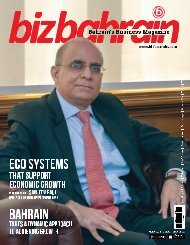You also want an ePaper? Increase the reach of your titles
YUMPU automatically turns print PDFs into web optimized ePapers that Google loves.
Business Report | OBG
Bahrain: Year in Review 2019
Despite ongoing fiscal challenges,
Bahrain’s economy proved
resilient throughout 2019, with
the World Bank projecting growth of
1.8%. While expansion of the non-oil
economy is expected to slow from 2.5%
to 2.2%, the oil sector is due to move back
into the black (0.2%), reversing the 1.2%
contraction recorded the previous year.
By most estimates, inflation has
remained low and stable, and was
on track to settle at 1.4% for the year,
according to IMF projections from
October, due in part to the exchange rate
peg to the US dollar.
This comes despite the introduction
of a 5% value-added tax (VAT) in January
2019, which some observers feared would
drive up prices. Indeed, the World Bank
forecast in October that inflation could
tick up to 3.3% by year’s end; however,
the latest figures from the Central
Informatics Organisation showed a rate
of 1.9% as of November.
Foreign direct investment (FDI),
meanwhile, was up 1% year-on-year at
$262.6m in the second quarter of 2019.
Kuwait accounted for the largest share
of FDI inflows, with $119.8m, followed by
India ($57.8m) and Saudi Arabia ($54.3m).
Fiscal adjustment progress
After a period of challenging fiscal
conditions for Bahrain, in 2018 Kuwait,
the UAE and Saudi Arabia collectively
pledged $10bn to shore up the country’s
finances and help it achieve a balanced
budget by 2022.
The funds were accompanied by
a comprehensive reform programme,
which largely came into effect in 2019
through the Fiscal Balance Programme
(FBP).
The programme includes the
introduction of VAT, targeted spending
cuts and a voluntary retirement scheme
that has reduced the public sector
workforce by 18% to date.
While these adjustments are broadly
seen as steps in the right fiscal direction
- most notably by global credit ratings
agency Standard & Poor’s (S&P), which
upgraded Bahrain’s outlook from stable
to positive in November - estimates vary
as to their ultimate impact on the deficit.
The IMF projects the budget shortfall
will grow moderately from 4.3% of GDP
in 2019 to 4.4% in 2020. The World Bank,
for its part, published a deficit projection
as high as 7.7% for 2020, though this
represents an improvement from its
projection for 2019. S&P was in the
middle of the pack, expecting the fiscal
deficit to continue to decline, from 5.7%
to 5.1%.
VAT implementation
On January 1, 2019 Bahrain become
the third GCC country - after the UAE and
Saudi Arabia - to introduce VAT, which
S&P estimates could raise government
revenue by 1.5% of GDP per year.
The deadline for compliance with
the 5% VAT was staggered. The first stage
mandated that businesses with annual
supplies in excess of BD5m ($13.3m)
register for VAT by December 20, 2018. In
the second stage businesses with more
than BD500,000 ($1.3m) worth of annual
supplies were required to register before
June 20, 2019.
16 January-February 2020
















